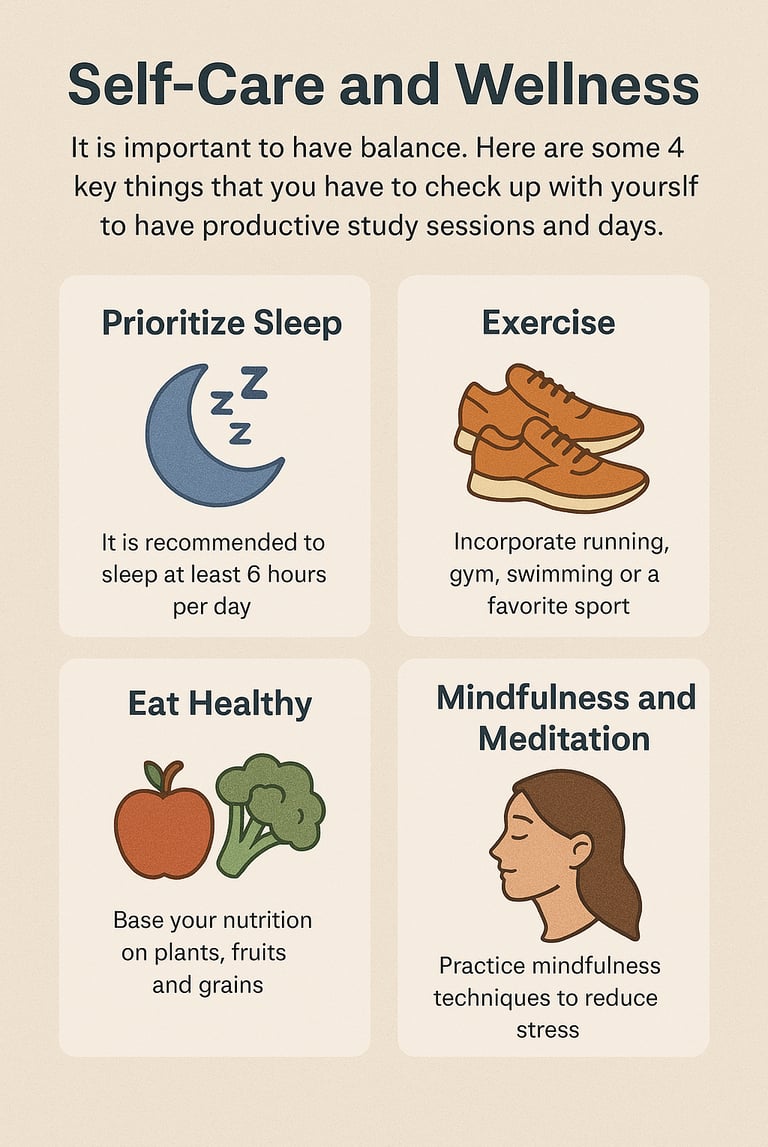Beyond the summaries: How to thrive socially in medical school.
**📚 Med School & Social Life: Finding the Balance!** Medical school is demanding, but you’re more than just a student! Prioritize **smart time management, setting boundaries, self-care, and building a strong support system** to prevent burnout and stay motivated. Don’t forget to explore passions beyond medicine—it’s key to long-term success! 💬 How do you balance studying and social life? Drop your tips below! ⬇️ #MedStudentLife #StudyBalance #SelfCare #FutureDoctors
Introduction
Being in university is not easy I know. You are a medical student with summaries, sheets, dues, projects, classes, hospital rounds, and clinical rotations. It's overwhelming if you pile everything up. You feel extremely exhausted, feel that you don’t have time for anything, for taking care of yourself, friends, exercise. However, this concept can lead to burnout, depression, anxiety, etc.
Here it is some tips to help you get motivated and remember that despite being a student you are human, you have to have any sort of social life and you need to make time for it.


Time management tips:
Managing your time is crucial that a medical student needs to develop during his career. Lectures, clinical rotations, study sessions, making time for exercising, food and everything can be challenging. So here are some tools that can optimize your time:
- Create a Schedule: outline weekly hours in an A4 sheet on Word, Notion, or any app that can create tables and put your classes, study times, clinical rotations, time for yourself, and social appointments on the sheet of paper so you can review it every week and create a routine for it.
- Use a digital calendar: set up all the important dates that you have to go over, so you don’t miss them and you can plan your weekdays
- Be realistic with your goals: when preparing for exams or to do things, don’t try to put in a million tasks or activities that are way over your capacity, put in a time difference so you can work on yourself.
- Don’t use a million productivity apps: there are a lot of apps on the internet to pick from, and you may think that you need all of them to be productive, but on the contrary, it's better to have one, that does the most and facilitates your life.
Setting boundaries
- Respect yourself: you can study as much as you want, but remember that having a moment to take care of yourself and have different activities with friends colleagues, or family is important too. Having free time helps your brain recharge and helps you be with a lower stress level so when you get back to study, it's easier.
- Prioritize what makes you feel good: don’t accept every single invitation that people come to you, you might be a person who rather relax playing games, reading, or just being on your own, or you might be a person who loves going to coffee shops and catch up with friends. Remember to prioritize what feels better so you can relax and connect with your friends.
- Schedule your hangouts: there are two opposites of people, the ones that say that don’t have time for anything and the ones that are always “free” and when it comes to due dates and things that have to be delivered, have less time to do what matters, remember to put down this on the paper when you are planning your week.


Building a strong support system:
Remember, when you are in university, it's way harder to get through it alone, it's always better to do it with a group of friends and colleagues they are there to support each other on the ups and downs.
Prioritize real friendships: make time and schedule moments with your friends, it could be study sessions, coffee, movie night, or just a talk hangout, that helps you grow a friendship and relax.
Get yourself involved with mentorship and academic advising:
There are a lot of people who are in their lower years or new to the university that they don’t know what is ahead, being a senior giving advice could help give safety to younger people and feel more confident with uni and the major itself.
Help others: be a mentor for people, even if you feel that you are not THE ABSOLUTE BEST student out there, people look forward to experience, and when you talk and give pieces of advice, you can create a bond and help others through their journey in uni.


Self-care and wellness
It is important to have balance. Here are some 4 key things that you have to check up with yourself to have productive study sessions and days.
1- Prioritize sleep: it is recommended to sleep at least 6 hours per day, and it's true, that having a good night of sleep even if it is 6 hours, sleep is key for memorizing and remembering your classes and your study sessions.
2- Execersie: It is important to incorporate exercise, running, gym, swimming, or even a favorite sport to help you relax, liberate endorphins and help you to relax, help you to feel better physically, and help you avoid future diseases like diabetes and cardiovascular.
3- EAT health: base your nutrition on plants, fruits, and grains, you could add a slice of meat or protein depending on if you are vegan or vegetarian, but reduce the amount of fast food and sweets that you eat. That can reduce your productivity, and make you feel slow
4- Mindfulness and Meditation: Practice mindfulness techniques to reduce stress.
Finding passion outside of medicine
While medical school can be demanding, it's essential to find fulfilling activities outside of your studies. Here are some tips to help you discover and nurture your passions:
Explore Your Interests: Reflect on what you enjoy doing in your free time. Consider activities you've always been curious about or those that bring you joy.
Try New Things: step outside your comfort zone and try new experiences. Join clubs, volunteer, or take up a new hobby.
Follow Your Curiosity: If you find something interesting, dive deeper. Read books, watch documentaries, or attend workshops.
Connect with Like-Minded People: Joining clubs or communities related to your interests can provide a supportive network and opportunities to learn from others.
Don't Be Afraid to Fail: It's okay to try something and not enjoy it. The important thing is to keep exploring until you find what you love.
Remember: Finding your passion outside of medicine can enhance your overall well-being and provide a much-needed break from the stresses of medical school. It's a valuable investment in yourself that can benefit your personal and professional life.
Conclusion
Navigating medical school while maintaining a healthy social life can be challenging, but it's essential for your overall well-being. By implementing effective time management strategies, setting boundaries, building a strong support system, and prioritizing self-care, you can thrive academically and personally. Remember to explore your passions outside of medicine to find balance and fulfillment in your life.
While medical school can be demanding, it's essential to find fulfilling activities outside of your studies. Here are some tips to help you discover and nurture your passions:
Explore Your Interests: Take time to reflect on what you enjoy doing in your free time. Consider activities you've always been curious about or those that bring you joy.
Try New Things: Don't be afraid to step outside your comfort zone and try new experiences. Join clubs, volunteer, or take up a new hobby.
Follow Your Curiosity: If you find something interesting, dive deeper into it. Read books, watch documentaries, or attend workshops.
Connect with Like-Minded People: Joining clubs or communities related to your interests can provide a supportive network and opportunities to learn from others.
Don't Be Afraid to Fail: It's okay to try something and not enjoy it. The important thing is to keep exploring until you find what you love.
Remember: Finding your passion outside of medicine can enhance your overall well-being and provide a much-needed break from the stresses of medical school. It's a valuable investment in yourself that can benefit your personal and professional life.
